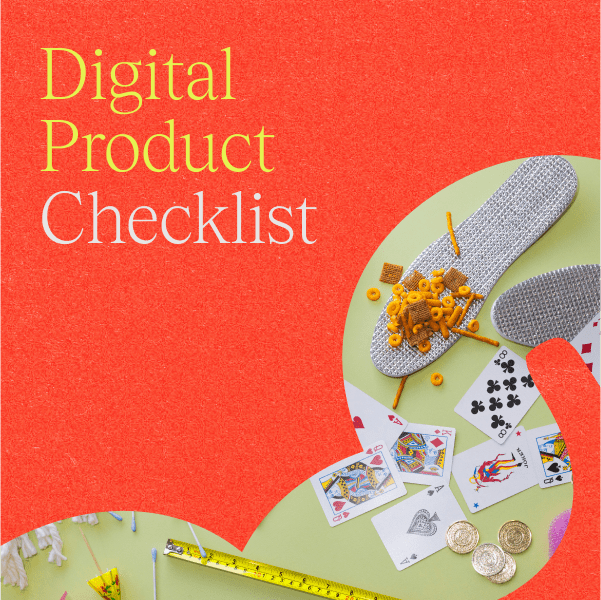Digital products are blowing up, and so are the platforms to sell them. In the last few years, a plethora of digital product sales platforms have emerged to meet the market’s growing demand. And no two are the same.
Some platforms are designed specifically to sell digital products, while others have recently adapted to sell digital products in addition to physical merch. Some allow creators to build their own website or storefront, while other, leaner platforms let creators sell anything with simple checkout buttons and download links. And while some provide a wealth of built-in marketing tools, others lean more heavily on sales analytics. There are also some platforms that only cater to a very specific niche, like design-focused creators or DIYers.
That’s a ton of things to think about. And, as a creator, it can be overwhelming to wade through the options. We get it! That’s why we’ve done it for you. Here, we’re unpacking exactly what you should consider when choosing a platform to sell digital products, as well as the 10 best platforms to sell digital products right now.
New to selling digital products? Download our free digital product launch checklist to get organized!
Things to consider when choosing a platform to sell digital products
Digital products sales platforms come in all shapes and sizes, at all kinds of price points, and stocked with all kinds of features. So, naturally, there are tons of things to consider when choosing the platform you’ll use to sell your digital products. Here are the most important ones:
Ease of use

Of course, one of the first things you want to consider when choosing a platform to sell digital products is how easy it is to use. As a creator, your time is money — literally! You’re already hard at work creating awesome content and new digital products; the last thing you want is to have your time and energy sapped by a clunky, complicated sales platform.
Most sales platforms provide potential users with a free trial to test out its features and usability. We suggest taking full advantage of these! During your free trial, work through all the features you’ll be using for your business. See if the platform feels intuitive to you. If it doesn’t, onto the next!
Pricing plans and scalability options

As an entrepreneur — or even if you’re new to the game — you probably already know a thing or two about budgets. Knowing where to spend and where to save, and making sure you’re paying a fair price for your tools, is crucial to your business’s profitability. So, cost is something you’ll want to pay attention to when choosing your sales platform.
Most platforms have an array of pricing plans for every kind of creator — and every kind of budget. Each tier of plan provides users with a different set of features, with more expensive plans offering more comprehensive features. Before taking the plunge, set out a budget for yourself. How much do you want to spend on your sales platform? Also consider the kinds of features you really need to run your business. You don’t want to pay extra for features you’ll never end up using.
When purchasing or subscribing to your sales platform, you’ll also want to keep scalability in mind. In other words, you’ll want to think about the future of your business. How do you see your business growing in the next year? Three years? Five years? Will you be increasing your product offering in the next year? If so, by how much? Will you be hiring others to work for you, or will you continue flying solo for the foreseeable future?
Most pricing plans place a limit on how many products you can sell, how many team members can use the platform, and so on. So, you’ll want to take scalability into consideration when choosing your platform. Remember, your sales platform should help you grow your business — not hinder it.
Payment processing and transaction fees

No one wants to be slammed with extra, hidden fees — especially if you’re a small business owner. Before you sign up for a sales platform, make sure you read the small print; this includes any payment processing and transaction fees.
In addition to your subscription or sign-up fee, most sales platforms will take a cut of each of your sales. Some platforms take a larger cut than others, so you’ll want to do a little research and compare each platform’s payment processing and transaction fees before making the commitment. This will help you make the most profits from your digital products.
Customization options

Personal brand is (almost!) everything when it comes to being a creator. Your unique branding helps you stand out within your niche, and can be a major selling point for new followers and potential buyers. Many online sales platforms understand this and provide creators with tons of customization option to help them create the look and feel they want for their online storefront.
When researching potential sales platforms, be sure to pay close attention to its customization options. Some platforms have a wealth of them, while some have considerably fewer. Before choosing, you might want to make a mock-up of (or have in mind) the look you want for your online shop. Then see which sales platforms can help you bring it to life.
Integration with marketing and analytics tools

Today, there are tons of online tools to help creators, well, create. That means you’re probably already using and paying for a few apps and tools to help you with marketing, social media analytics, and more.
If you already have a few apps in your business rotation, you’ll want to make sure they’re compatible with and can be integrated into your online sales platform. Most platforms have integrations with at least a few other creator tools, but likely not all, so you’ll want to do a little research before landing on one.
Choosing a sales platform with the right integrations will make your workflow more seamless, saving you time and effort.
Customer support

When there’s something wrong with your digital products, who you gonna call? Customer support!
It’s inevitable that you’ll experience a hiccup or two with your digital product sales or your platform of choice. And that’s precisely why you’ll want to make sure the platform you choose offers a reliable, readily available, and well-versed customer support network.
Before subscribing to one platform or another, check out their CX page. Look at when customer support is available (24/7 or only 9 to 5?), how they’re available (chat, phone, or email only?), and who’s available (some platforms offer a creator community or marketplace of experts who can help you with specific, in-depth questions about things like growing your business.)
11 Best platforms to sell digital products
1. The Leap
Looking for the ultimate creator monetization tool — and one that’s free? Then you’ll want to get in on The Leap.
The Leap is the latest tool from the leading creator educator platform Thinkific. This all-in-one platform functions as a link-in-bio tool, an online storefront, and an easy-to-use digital product builder, allowing creators to create and sell digital products all from one place. Designed with lead generation and sales in mind, The Leap helps creators transform their knowledge into digital products and their followers into paying customers, quickly and easily.
The Leap’s AI-powered digital product builder enables creators to bring their product ideas to life, whether it’s a tutorial, a mini-course, or a guide. Because it’s so easy to use, The Leap’s zero-cost, user-friendly authoring tool empowers creators to turn their products into lead magnets, which helps them grow their email list — and their pile of cash.
The platform also offers creators an array of audience analytics, including sales and leads reports, that give them the insights they need to create the digital products that will fly off the (digital) shelves.
The Leap is designed for creators looking to jumpstart their monetization journey. And if you leverage all of its features in tandem, you’ll have yourself an income engine that’ll power your business and earn you even more money over time.
The best part about The Leap? It’s all free!
Key features
- Mobile-optimized link-in-bio storefront
- In-app payment processing
- AI-powered digital product builder for mini-courses, tutorials, guides, and challenges
- Email list builder
- Audience analytics
- It’s free!
Pricing
Free!
Ready to start earning? Create your link-in-bio storefront on The Leap today.
2. Gumroad
Gumroad is many creators’ go-to for selling digital products directly to their audience. This easy-to-use e-commerce platform allows creators to build their online storefront (no website or domain needed) and sell virtually any kind of digital product, including ebooks, online courses, films, Notion templates, downloadable prints, music albums, and more. Just upload your digital product, set a price, and Gumroad will handle the rest.
Have your own website? No problem! Creators can also embed Gumroad’s checkout widget into their existing site. The platform also allows creators to set their own currency and supports a range of payment methods.
Unlike other platforms, Gumroad doesn’t charge a monthly fee. This means it’s technically free to start selling digital products on Gumroad, which is great news! However, keep in mind that the platform does take a 10% cut of each sale (and this doesn’t include additional credit card processing or PayPal fees.)
Key features
- User-friendly interface
- Online storefront builder
- Embeddable checkout widget for your own website
- Customizable storefront and checkout pages
- Subscriptions, pre-orders, and payment plans
- Content security features including unique download links, PDF stamping, purchaser IP tracking, generating license keys for software
- Built-in marketing tools including affiliate programs, and discount codes and coupons
- Built-in analytics tools
Pricing
Free with a 10% transaction fee per sale (plus credit card processing and PayPal fees).
3. Etsy
For over 15 years, Etsy has been the internet’s marketplace for handmade products, craft supplies, and vintage items. However, recently, the platform has become a robust marketplace for digital products as well. Need some convincing? Currently, a search for “sewing pattern PDF” yields over 636,000 results.
Etsy’s digital product game is about much more than just sewing patterns. The platform supports many different file formats, allowing users to sell myriad digital products, including downloadable prints, greeting cards, printable planners, ebooks, Lightroom presets, and much more.
Not only does Etsy make it easy to upload and sell your digital products, it also exposes them to a massive market of DIYers and crafters. That means, if you’re creating within the arts-and-crafts niche or are a visual creator, Etsy is probably the platform for you.
Etsy functions as a marketplace, allowing creators to set up an online storefront within the platform. While sellers can add a header to their store, Etsy offers creators little else by way of customization. If you’re looking to build a more personalized storefront, Pattern allows you to build your own custom, Etsy-powered e-commerce website for $15/month.
Key features
- Digital marketplace with over 96 million buyers
- Integrated storefront
- Limited marketing features including discount codes and coupons, and customer reviews on PLPs
- Built-in sales and traffic analytics tools
Pricing
Free with a $0.20 fee per listing and an additional 6.5% transaction fee per sale, plus regional payment processing fees.
4. Stan
Stan is a new e-commerce platform catered specifically to creators selling digital products, online courses, and coaching sessions. Sounds perfect, right? Stan promises to have your personalized storefront up and running in just five minutes with its easy-to-use drag-and-drop store builder. From there, simply upload your digital product, set your price, and wait for the dough to roll in.
In addition to coaching sessions, Stan allows creators to sell many kinds digital products, including ebooks and guides, templates and tools, exclusive video content, and courses. Looking to sell the latter? Stan also provides creators with an e-course builder, allowing you to create, promote, and sell your online courses all in one place.
Stan also helps you maximize your profits with in-app marketing features, including an email list and newsletter builder, and the option to promote customer testimonials on your product pages. Harness these — and Stan — and see you digital products fly off the digital shelves.
Key features
- Drag-and-drop online storefront builder
- Mobile optimized checkout
- Built-in audience analytics
- Built-in marketing tools including newsletter builder and option to promote customer reviews on PLPs
- Online course builder
- Membership and subscription payment plans
- Robust third-party app integrations
Pricing
$29/month with 0% transaction fees.
5. Thinkific
Creator educators, take note: Thinkific allows you to create and sell online courses, build your learning community, and monetize memberships — all on a single platform. In other words, if you’re a creator educator, this is the platform for you.
Thinkific allows you to monetize your expertise, by creating and selling online courses in the way that works best for you — and your audience. This platform’s robust course builder allows you to create feature-rich lessons with video, audio, presentations, PDFs, as well as self-paced and drip scheduled courses with quizzes, assignments, and completion certificates. To take your teaching even further, the Thinkific mobile app allows your students to consume your course content wherever and whenever they want.
Thinkific is also your go-to platform for building (and monetizing) your learning community. This platform allows you to connect your courses to your community for a seamless student experience. Provide each of your students with a unique username and let them provide feedback on courses, react to comments, and start conversation threads with each other. Push notifications also ensure your students don’t miss a single beat when it comes to community.
Even better? Thinkific is totally scalable. Its flexible plans grow with your business, allowing you to unlock advanced features as your business needs evolve. Want to create multiple courses? No problem! And you can control them all from one dashboard.
Key features
- Online storefront
- Online course builder
- Customizable web themes and custom domains
- Dedicated community spaces
- Memberships and subscription payment plans
- Built-in marketing features like bundles, coupons, and cross-selling
- Built-in audience analytics
- Robust third-party app integrations
- Best-in-class customer support and expert marketplace
- Scalable plans that grow with your business
Pricing
Free plan available. Basic plan at $36/month; Start plan at $74/month; or Grow plan at $149/month.
6. Sellfy
In terms of selling your digital products, it doesn’t get much easier than Sellfy. This e-commerce platform promises creators that they can “get their store up and running in 5 minutes.” That’s a pretty bold claim. But it’s one that holds up — and speaks to Sellfy’s seamless onboarding process and simple website builder.
That’s right, Sellfy allows creators to build their own e-commerce website, easily. And it also offers you the option to sell from your social media account, blog, existing website, or anywhere else using “buy now” widgets. But there’s more: Sellfy allows creators to sell virtually any digital product imaginable, from downloadable prints to ebooks and much, much more. Sellfy’s file-hosting services provide unlimited bandwidth on the amount of items you can sell at once.
Are you new to the digital product game? With its intuitive interface, robust digital product hosting services, and all-inclusive tools, Sellfy is an especially great option for creators who are new to selling digital products.
Key features
- E-commerce website builder
- Unlimited storage and bandwidth on file hosting
- Built-in sales analytics
- Built-in marketing tools
- Embeddable checkout widgets for your own website
- High-level security including SSL encryption
Pricing
Starter plan at $29/month; Business plan at $79/month; or Premium plan at $159/month with 0% transaction fees.
7. Payhip
Payhip makes it easy for creators to sell “anything online anywhere.” And that includes digital products. This all-in-one e-commerce platform supports virtually any digital product you can dream up: ebooks, workbooks, online courses, music albums, fonts, templates, printables, and beyond. Whether you’re selling digital downloads or online courses, Payhip has you covered. The platform allows creators to host an unlimited number of digital downloads and provides creators with a powerful online course builder.
Do marketing and branding matter to you? Then Payhip might be your platform. Payhip offers creators a breadth of powerful built-in marketing tools designed to boost sales, increase profits, and grow your business. These include affiliate systems, email marketing, social discounts, pay-what-you-want pricing, and more. Payhip also provides creators with a plethora of customization options across their storefront and checkout to provide customers with a seamless, totally on-brand experience.
Like many other platforms, Payhip offers a simple, tiered pricing plan (including a free plan!) However, you should note that Free and Plus plan users are charged transaction fees (between 5 and 2%) for each sale on top of their monthly fee. If you want to eliminate transaction fees, you’ll have to subscribe to the highest tier plan — and shell out $99/month.
Key features
- Online store builder with lots of customization
- Unlimited bandwidth and file storage
- Robust built-in marketing tools including affiliate systems, email marketing, discount codes, pay-what-you-want-pricing, and more
- Online course builder
- Embeddable checkout buttons for your own website
- Content security features including download limits, PDF stamping, and generating license keys
Pricing
Free plan at $0/month plus 5% transaction fee; Plus plan at $29/month plus 2% transaction fee; or Pro plan at $99/month with 0% transaction fees.
8. SendOwl
SendOwl is an e-commerce platform designed specifically to sell digital products. And that’s why you’re here, isn’t it? No matter what kind of creator you are or niche you occupy, SendOwl has you covered, allowing you to sell anything from ebooks to audio books, software to online courses, and anything in between. Essentially, if you can dream and download it, you can sell it on SendOwl.
SendOwl also features a plethora of marketing, analytics, and customization tools. On the marketing front, we’re talking easy 1-click upselling, affiliate programs, email marketing, pay-what-you-want pricing, and more. In terms of analytics, SendOwl will provide you with anything from order and discount code reports to income and abandoned cart analytics. Finally, SendOwl lets creators add custom branding to their storefront via HTML, CSS, and JavaScript, in addition to custom email and checkout templates.
But all those built-in tools will cost you. To use SendOwl, you’ll have to pay for your monthly plan in addition to transaction fees for each order. It’s also important to note that each plan (even the most costly one) places a cap on your file-hosting storage. So, you’ll want to consider just how many products you want to sell through SendOwl before choosing your plan — or signing up at all.
Key features
- Online storefront
- Memberships and subscriptions
- Built-in marketing tools including discounts and promo codes, 1-click upsell, affiliate marketing, email marketing, and pay-what-you-want pricing
- Robust built-in analytics
- Embeddable checkout buttons for your own website
- Automated product update delivery and option to create license keys for software
- Robust third-party app integration
Pricing
Starter plan with 3 months free, then $9/month with 5% management fee per transaction; Growth plan at $15/month with $0.33 management fee per transaction; or Pro plan at $39/month with $0.17 management fee per transaction.
9. DPD
Don’t need an online storefront? DPD is the ultimate in lightweight but comprehensive e-commerce. No need to deal with setting up a web shop: DPD allows creators to host and manage their digital products in one dashboard, while selling their products anywhere with embeddable “buy now” buttons. Sell from your existing website, blog, social media, and more — easily.
DPD hosts any size product of any type, meaning you can sell any digital product you dream up, from ebooks to songs, website themes to templates, and beyond. That also means DPD won’t charge you for bandwidth, even if you sell a million products. DPD protects your IP and your buyers with a plethora of security features, including PDF stamping and encryption, and SSL checkouts.
Even better? DPD charges zero transaction fees, zero commission on sales, and zero bandwidth fees. That means you just pay one flat fee every month. But keep in mind that DPD’s tiered plans each place a cap on your file hosting storage. That being said, if you’re looking for an affordable, no frills way to sell your digital products anywhere, look no further than DPD.
Key features
- Full feature shopping cart
- Embedded checkout buttons
- Unlimited bandwidth
- Built-in marketing tools including upselling, coupons, and discount codes
- Built-in sales analytics
- Automated product update delivery for software
- Security features like download controls and SSL checkouts
Pricing
$10/month for 20 products or 1GB of storage; $16/month for 35 products or 2GB of storage; or $30/month for 120 products or 6GB of storage. Want to sell even more products? DPD has plans up to 3500 products or 174B of storage for $280/month.
10. Shopify
Shopify is tops when it comes to selling stuff online — and that means digital products too. To start selling digital products, you’ll need to download and use Shopify’s free Digital Downloads app (or another third-party app through the Shopify app store, if you so choose.) From there, upload your product, disable shipping, and Shopify will deliver your digital product directly to your customers.
Shopify allows creators to sell anything online, including digital products from online courses to journal templates and everything in between. However, if you’d like to sell memberships and subscriptions to courses and the like, you’ll need to integrate a third-party app through Shopify’s app store.
If you don’t mind dealing with multiple apps to sell your digital products through Shopify, you’ll get to benefit from all of the platform’s robust features, including its easy-to-use drag-and-drop online storefront builder built-in marketing and analytics tools, and endless custom web themes.
Key features
- Drag-and-drop online storefront builder
- Tons of customization across storefront, checkout, emails, etc.
- Unlimited storage bandwidth and file storage
- Memberships and subscriptions through third-party apps
- Robust built-in marketing tools
- Robust built-in analytics tools
Pricing
Basic plan at $29/month billed yearly; Shopify plan at $79/month billed yearly; or Advanced plan at $299/month billed yearly.
11. Creative Market
Want to get your digital products in front of 9 million potential customers, instantly? Then, Creative Market is the place to be. This online marketplace caters specifically to design-focused creators, allowing them to sell digital design resources, like graphics, fonts, photos, mockups, illustrations, and templates, to a massive community of clients across the globe.
Creative Marketplace allows creators to set up their own online storefront within the platform’s marketplace. From there, they just need to upload their digital products and let the powerful search engine do its thing.
With its ease-of-use and built-in niche audience, it almost goes without saying that Creative Market is a great option for design-focused creators looking to sell their digital products. Depending on how you look at it, the only trade-off is its pricing. Creative Market is free to join (however, you’ll need to submit an application and have it accepted) and free to list items. Rather than being charged a transaction fee, Creative Market users are paid a commission of each sale. Commission rates vary per seller and product, but, by default, each shop earns at least 50% of the list price from each sale.
Key features
- Digital marketplace with over 9 million customers
- Integrated storefront
- Built-in sales and traffic analytics tools
Pricing
Free with varying commission rates per sale (up to 50%).
So, what is the best platform to sell digital products?
Today there’s certain no lack of places to sell your digital products online. But with all the options, it’s easy to get caught up in the details and default on choice paralysis.
In order to start making money off of your expertise and your digital products, you’ll need to host and sell them somewhere. Hopefully, our helpful guide to the best platforms to sell digital products has alleviated some of the pain points in your search — and has helped you land on the platform that’s right for you. Now get out there and start uploading those digital products!
Ready to start selling? Grab The Leap’s digital product launch checklist for more useful tips on making your first sales.
FAQ
Where can you sell digital products?
You can sell digital products through your own self-hosted website (e.g. Sellfy), an online storefront (e.g. Payhip, Stan, Thinkific), an online marketplace (e.g. Gumroad, Etsy, Creative Market), or a full-feature shopping cart app (e.g. DPD).
What’s the best platform for selling digital products?
Unfortunately, there’s no one answer to this question, because there are so many different kinds platforms with a myriad of different features. The best platform for selling digital products is the platform that’s right for your business needs, your audience’s needs, and your budget.
What digital products can you sell online?
You can sell any kind of digital product online. A digital product is anything you can sell online as a downloadable file. This includes anything under the umbrellas of videos and online courses, ebooks, templates, design files, and audio.
Follow The Leap on TikTok, Instagram, and YouTube for more creator tool and platform reviews. We also make a newsletter.




